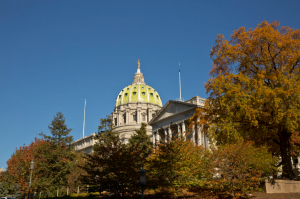By Steve Bittenbender | The Center Square

Recently, Pennsylvania’s Independent Fiscal Office released its initial projection on what impact the COVID-19 crisis will have on the economy. As expected, the report requested by the General Assembly painted a dire picture.
Looking at two scenarios – a six-week closure and a 10-week shutdown – the IFO forecasts combined revenue drops between $2.7 billion and $3.9 billion for the 2019-20 and 2020-21 fiscal years. For the state’s General Fund, the drop is between $1.4 billion and $2.2 billion.
Making the matter worse is that Pennsylvania just recently started to put money back in its Rainy Day Fund, a pool states use to allocate surplus amounts to stabilize budgets during future downturns. A $317 million deposit made on July 9 last year boosted the state’s reserve fund to $340 million.
“Because the future always has unknowns, the best plan is preparedness,” Democratic Gov. Tom Wolf said at the time. “A sufficient Rainy Day Fund ensures Pennsylvanians won’t have to cope with devastating cuts to programs like education if we face other economic bumps in the road.”
Unfortunately, it appears COVID-19 will create an economic pothole the current fund won’t be able to fill.
According to the Tax Foundation, that total represents about 1 percent of Pennsylvania’s annual expenditures. That ties the Keystone State with neighboring New Jersey with 47th healthiest percentagewise Rainy Day Fund in the nation.
Only Illinois and Kansas rank worse.
More than a decade ago, Pennsylvania had a $755 billion fund, but that went away during the Great Recession, and while other states sought to rebuild their funds, Pennsylvania’s languished.
With little in reserve to make the state’s budget whole, Republicans in the state House have been pushing for COVID-19 recovery initiatives to get underway. One proposal calls for state agencies to review debt obligations and decide if they should seek to refinance at a lower available interest rate.
“There is nothing to celebrate about this virus; however, one positive result is substantially reduced borrowing costs,” House Majority Leader Bryan Cutler, R-Lancaster, said in a statement. “We should re-examine all state debts and potentially save tens of millions of dollars. That savings could be used to help people and programs that will face monumental challenges as we work to recover from this crisis.”
Republicans are also targeting Wolf’s order last month that closed nonessential businesses, saying that directive went too far. Getting businesses reopened will help hasten the recovery.
State Rep. Frank Ryan, R-Lebanon, wrote a letter Thursday to Secretary of Health Dr. Rachel Levine, who has criticized GOP efforts to allow businesses to resume operations. Although he complimented the Wolf administration’s job in containing the spread of COVID-19, he said the “broad-brush” approach to business closures during the outbreak is hurting the state.
“Our failure to act now will cause untenable economic realities for Pennsylvania citizens,” Ryan wrote. “We simply cannot delay. Please work with us to save our small businesses and put working Pennsylvanians back to work.”








